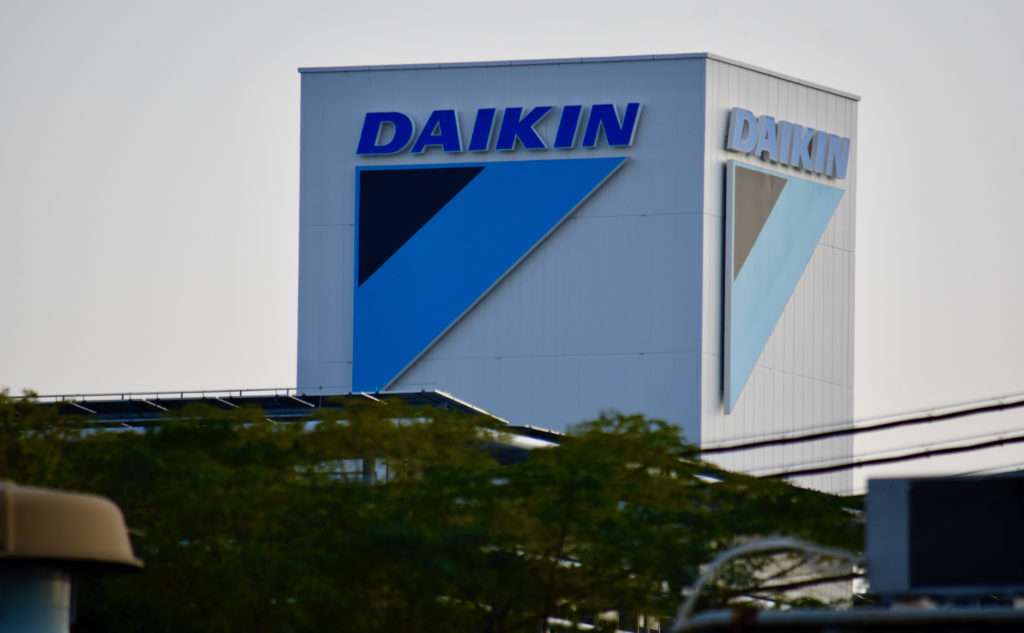UN Working Group “Businesses Should Take Responsibility As Required Under The Polluter Pays Principle”
2023.08.08 9:45 Nanami Nakagawa
Daikin Industries continues to deny responsibility for the worst PFOA pollution in Japan. While the national government and Osaka Prefecture stood on the sidelines and the mass media were loose on the issue, the United Nations finally took action.
The United Nations Working Group on Business and Human Rights visited Japan in late July and conducted hearings with residents in Settsu City, Osaka and scientists. They held a press conference at the Japan National Press Club on August 4, and pointed out:
“We would like to highlight the responsibility of the businesses involved to address this issue as required under the polluter pays principle.”
The results of this investigation will be reported to the United Nations Human Rights Council in June 2024.

Yodogawa Plant of Daikin Industries (Photo by Nanami Nakagawa)
UN Working Group Chairperson: “PFAS issue is important”
In the late 1960s, Daikin began manufacturing and using PFOA, a type of PFAS, at its plant in Settsu City, Osaka. Since then, a large amount of PFOA has been released outside the site. Even after the production and import of PFOA were banned by law in 2021, PFOA that has already been released and accumulated is contaminating groundwater, rivers, water in irrigation canals, soil, and agricultural products around the plant. A high concentration of PFOA was also detected in the blood of nearby residents.
However, Daikin has not done anything to clean up the polluted area around the factory or compensate the residents who suffered damage.
One of the members of the Working Group who came to Japan were Damilola Olawuyi, Chairman of the United Nations Working Group on Business and Human Rights, and Pichamon Yeophantong, a member of the Asia-Pacific region. They have been in Japan since July 24 to investigate human rights violations in Japan, such as PFAS contamination, sexual violence by Johnny Kitagawa, and discrimination against sexual minorities.
On July 29, interviews with Settsu residents were conducted in Osaka. About 40 people attended, including NGO representatives, university professors, and scientists involved in the field of “Business and Human Rights.”
In a five-minute speech, a representative of Settsu residents appealed for the actual situation of PFOA pollution by Daikin and the government’s and administration’s serious lack of response.
“Both the Osaka Prefectural Government and the national government acknowledge that the main cause of PFOA pollution in Settsu City is the Yodogawa Plant of Daikin Industries. Yet, while Daiki recognizes the use of PFOA, it denies that it is the source of pollution and refuses to remove PFOA from polluted areas. Daikin even goes so far as to say, “Daikin is not aware of any health hazards caused by PFOA,” and is reluctant to conduct health surveys on local residents.”
Chairman Olawuyi asked, “We recognize the importance of the PFAS issue. What do you think is needed to resolve it?”
One Settsu resident answered as a representative:
“Currently, in Japan we only have standards for water, but we need standards and surveys for soil, food, and human health. I think it is important to hold companies and other PFAS emitters accountable.”
Residents also described the PFOA pollution Daikin caused in the United States. In 2018, Daikin’s U.S. corporation paid the plaintiff residents $4 million to settle the case, despite the pollution level being lower than the Settsu pollution. Residents of Settsu felt that it was unreasonable not to take responsibility in Japan.
No response from Daikin
The press conference was held at 3:00 p.m. on August 4 at the Japan National Press Club in Hibiya, Tokyo.
Olawuyi and Yeophantong, who were in charge of the investigation, took the stage. Their report reflects the voices of local residents suffering from PFAS pollution damage.
“Concerned stakeholders indicated that neither the local nor national governments are taking sufficient steps to address the presence of these forever chemicals in the water supply and call for water and soil sampling and monitoring on the impact on the right to health.”
“We would like to highlight the responsibility of the businesses involved to address this issue as required under the UNGP (Guiding Principles on Business and Human Rights) and the polluter pays principle.”
How will Daikin perceive and respond to the indications from the United Nations? Tansa asked Daikin, but as of 10:00 p.m. on August 4, 2023, there was no response from Daikin. I will report back as soon as I receive an answer.
(Originally published in Japanese on August 4, 2023. Translation by Mana Shibata.)
Polluted with PFOA: All articles
 Newsletter signup
Newsletter signup